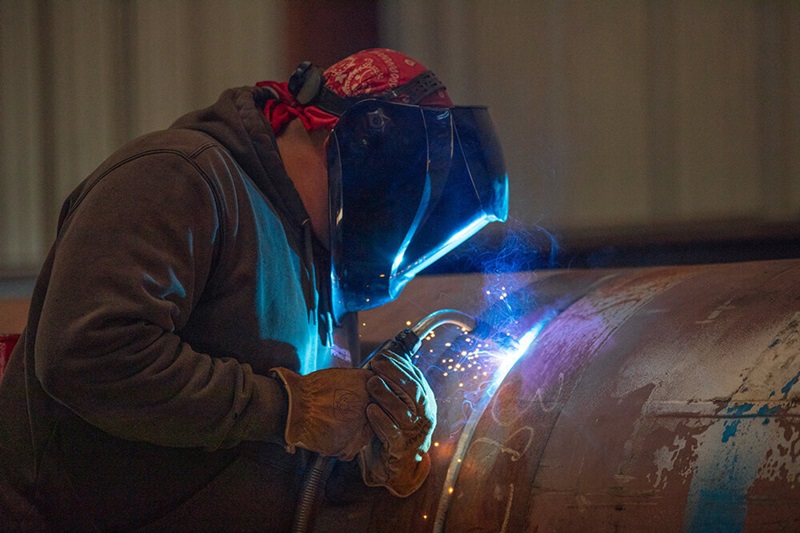 In the heart of America’s bustling industrial landscape, nestled within the dynamic state of Oklahoma, lies a critical component of our modern world: pipe fabrication. This intricate process, essential to countless industries, remains a cornerstone of development and progress. While the term might not immediately capture the imagination, the world of pipe fabrication, especially by skilled steel pipe fabricators, is a fascinating blend of technology, craftsmanship, and engineering prowess. Steel pipe fabricators in Oklahoma play a pivotal role in shaping the state’s industrial future.
In the heart of America’s bustling industrial landscape, nestled within the dynamic state of Oklahoma, lies a critical component of our modern world: pipe fabrication. This intricate process, essential to countless industries, remains a cornerstone of development and progress. While the term might not immediately capture the imagination, the world of pipe fabrication, especially by skilled steel pipe fabricators, is a fascinating blend of technology, craftsmanship, and engineering prowess. Steel pipe fabricators in Oklahoma play a pivotal role in shaping the state’s industrial future.
What Are the Key Factors in Location Decisions?
Understanding where pipe fabrication occurs is crucial in appreciating its complexity. Several factors influence this decision:
On-Site Support Personnel
The availability of skilled workers and support staff, including experienced steel pipe fabricators, is vital for timely and efficient fabrication.
Welding Facilities and Resources
Adequate and advanced welding infrastructure is necessary for handling steel pipes and is essential for high-quality outputs.
Coordination with Other Trades
Successful projects require seamless integration with other construction and fabrication trades, particularly when working with steel pipes.
Impact of Weather
Outdoor conditions can significantly affect both the process and the final product, especially in a variable climate like Oklahoma’s.
Pipe Material and Size Considerations
Different materials and dimensions, especially those of steel pipes, require unique handling and techniques.
Accessibility and Safety
Ensuring easy access to the site and prioritizing safety are paramount, particularly when dealing with heavy steel pipes.
New vs. Existing Systems
The approach differs substantially between fabricating pipes for new systems and retrofitting existing ones, with steel pipe fabricators often facing unique challenges.
Environmental and Quality Standards
Compliance with environmental regulations and maintaining quality standards, especially when working with steel pipes, are non-negotiable.
Diverse Styles of Pipe Fabrication
In the realm of pipe fabrication, two primary styles stand out:
Shop Pipe Fabrication
This method involves fabricating pipes, particularly steel pipes, in a controlled indoor environment, offering advantages in quality control and efficiency.
Field Pipe Fabrication
Conversely, field fabrication takes place directly at the project site, allowing for greater flexibility and adaptability to specific site conditions, which is often essential when working with large-scale steel pipe projects.
What Process Do the Steel Pipe Fabricators Follow?
The process of pipe fabrication is a meticulous and multi-step endeavor:
Marking and Tagging: Each piece, particularly steel pipes, is carefully marked and tagged for identification.
Cutting: Precision cutting is vital for ensuring accurate sizes and shapes, especially for steel pipes.
End Preparation: This step involves preparing the pipe ends, including those of steel pipes, for welding.
Welding: The heart of pipe fabrication, where pieces are fused together, with steel pipe welding requiring particular expertise.
Pipe and Fitting Welding: Joining pipes and fittings, especially in the case of steel pipes, requires expert skill.
Detail Marking: Additional details are marked for assembly and installation, a crucial step in steel pipe fabrication.
Heat Treatment: Certain materials, like steel pipes, require heat treatment for durability.
Inspection: Rigorous inspection ensures the highest quality standards, which is especially important in steel pipe fabrication.
Post-Fabrication Treatments: Final treatments are applied as needed, particularly for steel pipes, to ensure longevity and resistance.
What Are the Essential Tools and Equipment?
Steel pipe fabricators employ a wide array of tools and equipment:
- Clamps (Chain, C, etc.), essential for securing steel pipes during fabrication
- Pipe fit-up and purging equipment are critical for ensuring the accuracy and safety of steel pipe fabrication
- Cutting and bevelling tools, specially designed for handling steel pipes
- Various wrenches and hammers are essential for assembling and adjusting steel pipe components
- Flange alignment tools, crucial in maintaining precision in steel pipe assemblies
- Pipe jacks and rollers, used for maneuvering and positioning heavy steel pipes
- Welding machines, central to the process of fusing steel pipe sections
- Rigging and transport gear necessary for moving large steel pipes
- Cranes (hydraulic, tower), key in lifting and positioning heavy steel pipes
- Pipe bending machines are used to shape steel pipes according to project requirements
Each tool plays a specific role in ensuring the precision and quality of the fabricated pipes, particularly in the case of steel pipes.
The Role of Steel Pipe Fabricators in Oklahoma
In Oklahoma, steel pipe fabricators are not just workers; they are artisans of an industry that supports the backbone of the state’s economy. From oil and gas to water management and construction, their expertise is pivotal in shaping the infrastructure and future of Oklahoma. The contribution of International Pipe, one of the most renowned steel pipe fabricators in Oklahoma, goes beyond mere construction; it’s about building a legacy of industrial strength and resilience.
